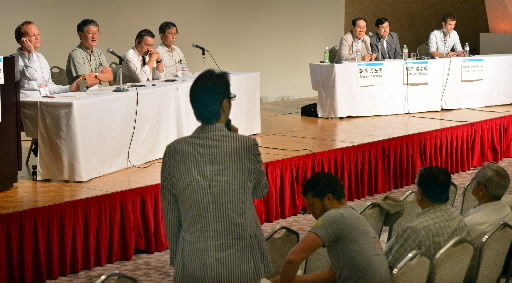Voices calling for an end to nuclear energy are heard on final day of IPPNW World Congress
Aug. 30, 2012
by Michiko Tanaka, Staff Writer
On August 26, the final day of the 20th World Congress of the International Physicians for the Prevention of Nuclear War (IPPNW) was held at the International Conference Center Hiroshima to discuss issues involving nuclear energy. In addition to voices calling for an end to dependence on nuclear energy, there were conflicting views with regard to the effects of low-dose radiation exposure on the human body.
At the plenary session on the theme of nuclear energy, four speakers presented their perspectives. Tetsuji Imanaka, an assistant professor of the Kyoto University Research Reactor Institute, argued, “Constructing nuclear power plants in Japan, a country prone to frequent earthquakes, is absurd.” Andi Nidecker, an IPPNW At Large Director from Switzerland, appealed for an end to the use of nuclear energy, also pointing out the dangers of radiation exposure to those involved in the mining of uranium, a source of fuel for atomic power.
At the same time, there were conflicting views over the accumulated dose of radiation exposure that could be harmful to human health. When Otsura Niwa, a committee member of the International Commission on Radiological Protection (ICRP), commented, “The carcinogenic risk of exposure to 100 millisieverts or less has not been clarified,” the doctors in attendance responded, one after the other, that the possibility of adverse effects from even low-dose exposure must be stressed. Mr. Niwa, however, rebuffed this position by stating, “Stirring up anxiety poses problems as well.”
Physicians from Hiroshima then presented their response to the accident at the Fukushima No. 1 (Daiichi) nuclear power plant. Kenji Kamiya, the director of Hiroshima University’s Research Institute for Radiation Biology and Medicine, located in Minami Ward, Hiroshima, spoke about health examinations for the people of Fukushima, saying, “It’s vital that the examinations proceed and that information be shared among residents, experts, and local governments. We will continue to lend our support by making use of our experience and expertise in treating A-bomb survivors.”
Koichi Tanigawa, a professor of Emergency Medicine at Hiroshima University Graduate School, reported on cases in which the elderly and hospital patients died of low body temperature and dehydration during evacuation, underscoring the importance of preparing thorough evacuation plans in the event of emergency.
(Originally published on August 27, 2012)
On August 26, the final day of the 20th World Congress of the International Physicians for the Prevention of Nuclear War (IPPNW) was held at the International Conference Center Hiroshima to discuss issues involving nuclear energy. In addition to voices calling for an end to dependence on nuclear energy, there were conflicting views with regard to the effects of low-dose radiation exposure on the human body.
At the plenary session on the theme of nuclear energy, four speakers presented their perspectives. Tetsuji Imanaka, an assistant professor of the Kyoto University Research Reactor Institute, argued, “Constructing nuclear power plants in Japan, a country prone to frequent earthquakes, is absurd.” Andi Nidecker, an IPPNW At Large Director from Switzerland, appealed for an end to the use of nuclear energy, also pointing out the dangers of radiation exposure to those involved in the mining of uranium, a source of fuel for atomic power.
At the same time, there were conflicting views over the accumulated dose of radiation exposure that could be harmful to human health. When Otsura Niwa, a committee member of the International Commission on Radiological Protection (ICRP), commented, “The carcinogenic risk of exposure to 100 millisieverts or less has not been clarified,” the doctors in attendance responded, one after the other, that the possibility of adverse effects from even low-dose exposure must be stressed. Mr. Niwa, however, rebuffed this position by stating, “Stirring up anxiety poses problems as well.”
Physicians from Hiroshima then presented their response to the accident at the Fukushima No. 1 (Daiichi) nuclear power plant. Kenji Kamiya, the director of Hiroshima University’s Research Institute for Radiation Biology and Medicine, located in Minami Ward, Hiroshima, spoke about health examinations for the people of Fukushima, saying, “It’s vital that the examinations proceed and that information be shared among residents, experts, and local governments. We will continue to lend our support by making use of our experience and expertise in treating A-bomb survivors.”
Koichi Tanigawa, a professor of Emergency Medicine at Hiroshima University Graduate School, reported on cases in which the elderly and hospital patients died of low body temperature and dehydration during evacuation, underscoring the importance of preparing thorough evacuation plans in the event of emergency.
(Originally published on August 27, 2012)








